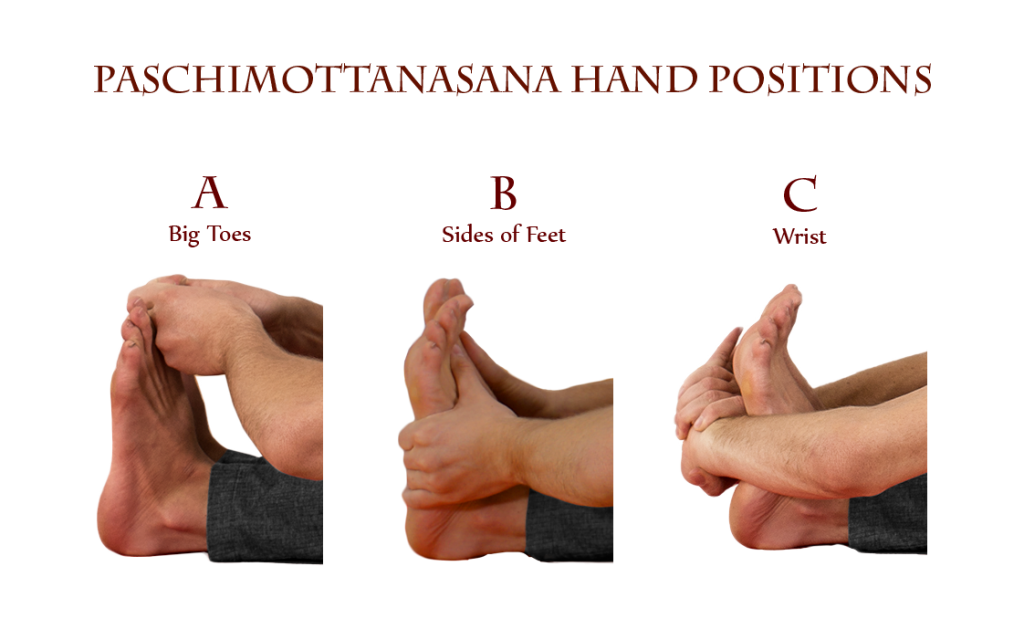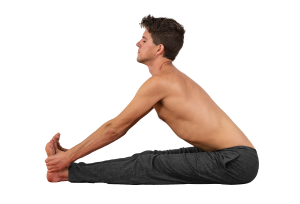Paschimottanasana
- Paschim: West / Behind (Referring to the dorsal or back surface of the body)
- Uttana: Stretched
- Asana: Pose
Paschimottanasana is the seventh pose of the primary series, and the second seated pose. Paschimottanasana has 3 progressively deeper variations: A, B, and C, distinguished by the position of the hands.
FOCUS ON…
Principles of Forward Folding:
Vinyasa of the Pose
From Dandasana, inhale and reach upwards with the arms, using that movement to lengthen the belly and torso even further. Make sure that the legs are still participating.
Exhale, and take hold of the big toes with the first two fingers of each hand.
Inhale and reset, tugging with the strength of the shoulders to pull the chest through the arms, straightening the spine.
Exhale and fold fully, still pulling with the arms. Resist with the feet, pressing the balls of the feet forward and spreading the toes. This is the state of Paschimottanasana A; hold here for five breaths.

After five breaths, inhale and sit upright until the arms are straight.
Exhaling, grasp the outer edges of the feet with the fingers such that the ring fingers are just above the heels. Place the thumbs on the base of the big toes.
Inhale, pull with the fingers and pressing with the thumbs, wrapping the outer edges of the feet back and pressing the roots of the big toes forward as you lift the heart through the arms.
Exhaling, fold forward. This is the state of Paschimottanasana B; hold here for five breaths. Continue pulling with the fingers and pressing with the thumbs to wrap the outer edges of the feet back and press the roots of the big toes forward.
After five breaths, inhale and sit upright until the arms are straight.
Exhaling, grasp either wrist with the opposite hand.
Inhale and reset, tugging with the strength of the shoulders to pull the chest through the arms, straightening the spine.
Exhale, and fold forward. This is the state of Paschimottanasana C; hold here for five breaths.

Inhaling, sit upright.
Exhaling, release the arms, placing the hands just forward of the hips. Take Vinyasa.
ALTERNATIVES & SOLUTIONS
If the hamstrings feel quite tight, or if you’re unable to sit up straight (the spine is rounding), place a blanket or block beneath the hips. Add additional support if necessary until both the legs and spine can be straightened.
If reaching the toes is challenging or makes you feel crunched, use a strap or towel. Pull the strap with your arms, resist with your feet. This will allow you to feel the interplay between the actions of the arms and the legs that allows the spine to lengthen and the chest to remain full. Otherwise, if you strain yourself to reach the toes, you will likely not be able to find or appreciate the subtleties of the posture.
Add the variations only as they become necessary; if you’re using the strap, only one variation is possible. Stay for additional breaths. Only add B variation after A (with no strap) is comfortable. Only add C variation after B is comfortable.
COMMON MISTAKES
It challenges coordination to move from the hips rather than the upper body in this pose. Many simply struggle to reach their toes, or to touch their head to the legs. That is not the goal. Discover and master the fundamental actions of the forward fold.
Do not tuck the pelvis & do not slump. Gravity will not do your work for you.








[…] Fuente de la Foto: up4yoga.com/paschimottanasana […]